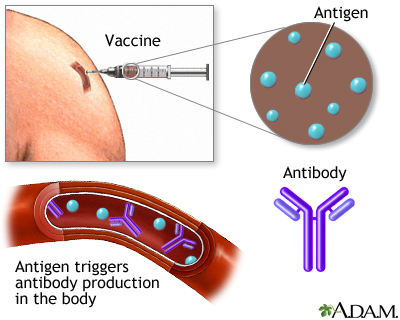Immunizations - General Overview
Hepatitis A immunization (vaccine)

Immunization is a process to initiate or augment resistance to an infectious disease. The goal of immunization is to prevent, and in some cases eradicate, potentially serious, life-threatening diseases.
Immunizations

Immunizations (vaccinations) are given to initiate or augment resistance to an infectious disease. Immunizations provide a specialized form of immunity that provides long-lasting protection against specific antigens, which cause disease.
Immunization (vaccination) is a way to trigger your immune system and prevent serious, life-threatening diseases.
Our bodies are designed to protect us from diseases. When you are exposed to an illness, your immune system actually learns from the experience. The next time your body is exposed to the same illness, your immune system often recognizes the culprit and sets out to destroy it. Immunization exposes you to a very small, very safe amount of the most important diseases you are likely to encounter at some point in your life. This mild exposure helps your immune system recognize and attack the disease efficiently. If you are exposed to the full-blown disease later in life, you will either not become infected or have a much less serious infection. This is a natural way to deal with infectious diseases. Throughout human history, infectious diseases have caused measureless misery and death. This rampage was unchecked until the twentieth century, when immunization was introduced on a wide scale. This led to the global eradication of smallpox, the elimination of polio from the Americas, and has almost eliminated tetanus, diphtheria, mumps, and the horrible congenital rubella syndrome. Immunization has greatly reduced the occurrence of measles, pertussis, and meningitis. Millions of deaths and other tragedies have been prevented. Four different types of vaccines are currently available. IMMUNIZING CHILDREN Babies get so many shots these days! Many parents are concerned that the sheer number of vaccines might overwhelm, weaken, or use up a baby's immature immune system. But a baby's immune system is built to make antibodies to as many as 10,000 foreign proteins. If a baby were to receive all 11 available vaccines at once, this would engage only a tiny fraction of the immune system. MERCURY A small amount of mercury (called thimerosal) is a common preservative in multi-dose vaccines. Despite concerns, thimerosal-containing vaccines have NOT been shown to cause autism or ADHD. Nevertheless, if you have concerns about mercury, all of the routine vaccines are also available without added thimerosal. IMMUNIZATION SCHEDULE The recommended immunization schedule is updated at least every 12 months by organizations such as the American Academy of Pediatrics. Consult your primary care provider about specific immunizations for you or your child. At every doctor visit, ask about the next recommended immunizations. TIPS FOR PARENTS Immunizations must be given as an injection (shot). The following tips can help make the experience easier for your child: IMMUNIZATIONS FOR ADULTS Immunizations are not only for children. Each year the CDC posts recommended adult immunizations on their website. Go there to learn about tetanus booster shots, the flu shot, hepatitis A and B vaccines, the pneumococcal vaccine, MMR, and immunizations for chickenpox and meningitis.
No comments:
Post a Comment